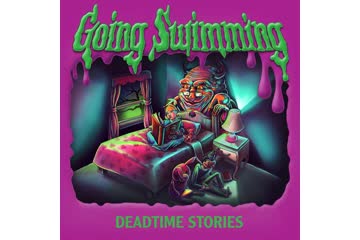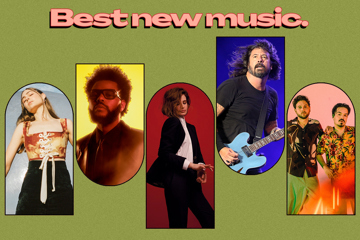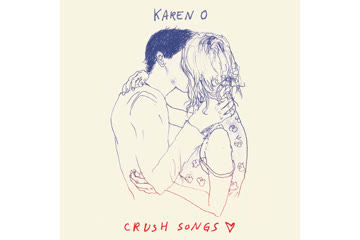Deafheaven's Kerry McCoy On The Band's Biggest Fears Around 'Sunbather'

"There were people who thought the world would be a better place if our mothers had aborted us because we were disgracing black metal."

When Deafheaven guitarist Kerry McCoy thinks about his band’s landmark second album, 2013’s Sunbather, he has a host of memories. Not just fond recollections of all the success that came in its wake, but all the complicated feelings that went into making it.
“When I play these songs, I have all these beautiful memories: of playing them at festivals, of the critical acclaim, of all the people who’ve told me how this record got them through someone dying or a breakup. But [these songs are also] wrapped up in memories of stress and fear and insecurity,” McCoy admits.
“What I remember most is being terrified of the sophomore slump. [Our debut album] Roads To Judah we worked really hard on, and we didn’t make any money, but we got to do all this fun stuff. We got to go to Europe two times, we went to Japan, we toured the States a bunch of times.
“And my big fear with Sunbather was that we were going to write this record, and nobody was going to like it, then we weren’t going to get to do any of that fun stuff anymore. That was my mentality when we were making it. I almost wish I could go back [in time] and tell that 24-year-old kid: ‘Don’t worry so much about it, it’ll be alright’.”
Alright is, of course, an understatement. Upon its release, Sunbather was met with wild critical acclaim for its mix of black metal and shoegaze sounds delivered with the dynamics of post-rock. It turned Deafheaven —a Bay Area band built around the creative core of McCoy and frontman George Clarke— into an instant crossover act, and still stands as a landmark album in the evolution of heavy music.
Ten years on, Deafheaven are playing Sunbather in full, for only the second time, at Dark Mofo in Tasmania. Their first performance, at Holland’s Roadburn Festival in April, felt like a form of time travel for McCoy.
“It’s weird,” he explains. “Usually, when we play the Sunbather songs live —and we literally have played Dream House at every single show we’ve done since it came out — I’m very in the moment. I’m enjoying being on stage and interacting with people on stage. But playing the album live [in its entirety], It’s almost an intimate thing with me, inside my own head.”
“It’s like looking at the me from ten years ago. I’m a very different guy these days than I was back then. There’s a big part of me that feels a lot of empathy for that guy. And, playing those songs, I can pretty viscerally remember writing them and what my life was like at that time. It’s an interesting experience, and an emotional one.”
Sunbather introduced the world to a band unafraid of mixing genres; in conversation, McCoy mentions the influence, in varying ways, of Converge, Isis and Slayer, but also Queen, Oasis and The Cranberries.
Where that provoked reaction upon Sunbather’s release — more on that in a moment — he feels as if, after years of “going through so many different genres and so many different styles whilst still sounding like us”, listeners are used to it, or they're young enough to just accept the band as they are. “There are kids coming to these shows now that were nine when Sunbather came out,” McCoy says.
Each of Deafheaven’s subsequent albums —2015’s New Bermuda, 2018’s Ordinary Corrupt Human Love, and 2021’s Infinite Granite — has its champions. “A lot of people come up to me and tell me that their favourite record is Ordinary [Corrupt Human Love], or New Bermuda. But, then again, these are people who are coming up to me and engaging with me, and probably trying not to just be a ‘Sunbather changed my life’ guy.”
But Sunbather was the record that changed Deafheaven’s lives, for sure: turning them from wholefoods and pizza shop employees into full-time musicians. It also turned them into a talking point, with much online discussion using the band as a symbol to argue contrary viewpoints. Depending on the author, they were either real metal or fake metal, trailblazers or turncoats.
“It was a very surreal experience. I’m glad I went through it once, but I don’t know if I’d want to go through it again,” McCoy offers. “We were so grateful for all of [our newfound success], but part of what came with that was being part of this discussion.
“I would see both sides of the argument and I would disagree with both. There were people who thought the world would be a better place if our mothers had aborted us because we were disgracing black metal. And then there would be people saying that this was Sigur Rós-level genius, that we were God’s gift, that we had invented a new musical genre.
“We realised that everybody involved in this argument is wrong. We are just these guys from California who like what we like, and we wrote these songs and this is what came out. We were appreciative that anyone was listening, and if people loved it, great, and if people didn’t like it at all that was okay. But just making this record didn’t make me a bad person.”
Deafheaven will play 'Sunbather' in its entirety at Dark Mofo on Thursday, 15 June. You can buy tickets here. You can also catch them on tour across Australia - find more dates below.
DEAFHEAVEN
INFINITE GRANITE AUSTRALIA & NEW ZEALAND TOUR
Wed 31 May – Max Watts, MELBOURNE w/Closure in Moscow & Suldusk
Thu 1 June – Max Watts, MELBOURNE w/Closure in Moscow & Run
Fri 2 June – Metro Theatre, SYDNEY w/Closure in Moscow & Run
Sat 3 June – The Triffid, BRISBANE w/Closure in Moscow & Run
Tue 6 June – San Fran, WELLINGTON NZ
Thu 8 June – Tuning Fork, AUCKLAND NZ
Sun 11 June – Rosemount Hotel, PERTH w/Tangled Thoughts of Leaving
Mon 12 June – Badlands Bar, PERTH
Tue 13 June – The Gov, ADELAIDE
Thu 15 June – Dark Mofo, HOBART
Tickets from Deafheaven's website and Bird's Robe.







